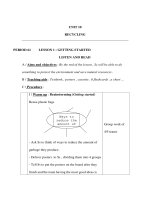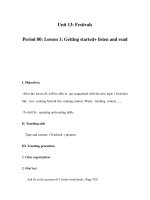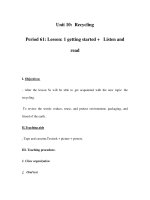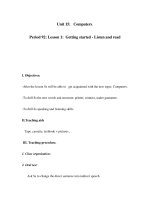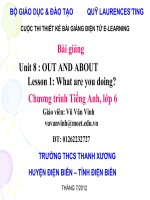Unit 8. Sports and games. Lesson 1. Getting started
Bạn đang xem bản rút gọn của tài liệu. Xem và tải ngay bản đầy đủ của tài liệu tại đây (140.38 KB, 5 trang )
<span class='text_page_counter'>(1)</span><div class='page_container' data-page=1>
<i><b>Period: 61</b></i>
<b>Unit 8: SPORTS AND GAMES</b>
<b>(Getting started)</b>
<b>I. Objectives</b>
<i><b>1. Knowledge, Skills, Attitude: </b></i>
<i><b>a. Knowledge: By the end of the lesson, Ss will be able to the lexical items related to the topic "sports and</b></i>
games" and use the combinations: go, play, do + N/Ving.
<i><b>- Vocabulary: lexical items related to sports and games.</b></i>
<i><b>- Grammar: the past simple</b></i>
<i><b>b. Skills: listening, speaking, reading and writing.</b></i>
<i><b>c. Attitude: hard, concentrated and active.</b></i>
<i><b>2. Capacity is formed and developed for students</b></i>
- Self – learning capability
- Communicative competence
<b>II. Preparation</b>
<i><b>1. Teacher: text book, extra board, cassette tape and real objects.</b></i>
<i><b>2. Students: textbook, notebook, workbook.</b></i>
<b>III. Students’ activities</b>
1. Warm up (5’)
<b>Students and teacher’s activities</b> <b>Contents</b>
- T asks Ss to work in pairs or groups to ask and
answer.
- Ss work.
- T guides and helps.
<i><b>* </b>Chatting:</i>
What do you do in your free time?
Do you play sports?
What sports do you do?
How often do you do it?
<i><b>2. Knowledge formation activities (36’)</b></i>
<b>Students and teacher’s activities</b> <b>Contents</b>
- T uses different techniques to teach vocab
(situation, realia, examples…..)
- Follow the seven steps of teaching vacab.
- Ss copy all the words
<i><b>1. Listen and repeat.</b></i>
<i><b>Vocabulary</b></i>
- Gym (n): trung tâm thể dục
- equipment (n) /i'kwipmənt/: dụng cụ, thiết bị
- congratulation /kən,grætju'lei∫nz/ (n): chúc mừng
- do karate/kə’ra:ti/: tập ka- ra- te
- breaktime (n): nghỉ giải lao
- (be) good at: giỏi về
- T asks Ss work in pairs ( 3 minutes)
- Have two Ss write the answers on the
board.
- T corrects.
* T gets Ss refers Ss to the conversation to
find the phrase
- Practise saying them together.
- T explains the meanings to the Ss
<i><b>a. Answer the questions</b></i>
1. Duong can play table tennis and do karate.
2. Mai is going to learn karate.
3. Because the equipment is morden and the people are
friendly.
4. Duong played with Duy and won (for the first time)
5. At the karate club.
<i><b>b. Find these expresssions in the conversation. Check </b></i>
<i><b>what they mean.</b></i>
1. Wow: used to express surprise
2. Congratulation: used to congratulate Sd/ to tell Sb that
you are pleased about their success
3. Great: used to show admiration
4. See you: used when you say goodbye
<i><b>c. Make a dialogue with the expressions. Then practice </b></i>
<i><b>them.</b></i>
<i>+ wow</i>
</div>
<span class='text_page_counter'>(2)</span><div class='page_container' data-page=2>
<i>+ Congratulations</i>
Eg: S3: Last week, I got a lot of good marks in Math.
S4: Congratulations. You are a good student.
<i>+ great</i>
<i>+ See you then</i>
Eg: S5: Hello. How are you
S6: I'm fine, thank you.
S5: This weekend is free. Would you like to go to the
cinema with me?
S6: Ok. What time?
S5: At 7.30 in front of the cinema.
S6. Great. See you then
- T plays the recording. Ss listen and repeat.
- T checks and corrects their pronunciation.
- T gives Ss the meaning of the words.
<i><b>2. Listen and repeat these words and phrases</b></i>
- T lets Ss name the sports and games in
Activity 3 individually first, then compare
their answer with a partner
- Teacher gives feedback.
<i><b>3. Using the words in 2, name these sports and games.</b></i>
* Keys:
1. cycling
2. table tennis
3. running
4. swimming
5. chess
6. skiing
- T asks Ss to do the activity 4 in pairs.
- Ss complete.
- T corrects.
<i><b>4. Work in pairs. Put the words from 2 in the correct </b></i>
<i><b>groups.</b></i>
<i><b>* Keys:</b></i>
<i><b>Play: chess, table tennis, volley</b></i>
<i><b>Do: boxing, aerobics, karate</b></i>
<i><b>Go: fishing, cycling, swimming, running, skiing</b></i>
- T lets Ss do activity 5 individually.
- Ss complete.
- T corrects
<i><b>5. Put the correct form of the verbs “play, go, do, watch</b></i>
<i><b>and like” in the blankets.</b></i>
<i><b>* Keys:</b></i>
1. do 2. is watching 3. goes
4. likes 5.played
<i><b>3. Consolidation 4’</b></i>
- Let Ss work in pairs or groups asking and
answering the questions.
- Move around the class to help / encourage
Ss to do their task.
- Call some pairs to demonstrate their results
in front of the class.
<b>6. Work in pairs. Ask your partner these questions to </b>
<b>find out how sporty they are.</b>
<i><b>4. Using knowledge (option)</b></i>
<i><b>5. Further practice (option)</b></i>
<b>IV. Experience:</b>
………
………
………
<i><b>Period: 62</b></i>
<b>UNIT 8: SPORTS AND GAMES</b>
<b>(A Closer Look 1)</b>
<b>I. Objectives</b>
<i><b>1. Knowledge, Skills, Attitude: </b></i>
</div>
<span class='text_page_counter'>(3)</span><div class='page_container' data-page=3>
<i><b>- Vocabulary: lexical items related to sports and games.</b></i>
<i><b>- Grammar: the past simple</b></i>
<i><b>b. Skills: listening, speaking, reading and writing.</b></i>
<i><b>c. Attitude: hard, concentrated and active.</b></i>
<i><b>2. Capacity is formed and developed for students</b></i>
- Self – learning capability
- Communicative competence
<b>II. Preparation</b>
<i><b>1. Teacher: text book, extra board, cassette tape and real objects.</b></i>
<i><b>2. Students: textbook, notebook, workbook.</b></i>
<b>III. Students’ activities</b>
1. Warm up (5’)
<b>Sts’ and T’s activities</b> <b>Contents</b>
- T: Who can give me some sports and games?
- Introduce the new lesson.
<b>Warm up. Network</b>
<b> Cycling Chess </b>
Running Karate
<i><b>2. Knowledge formation activities (36’)</b></i>
<b>Sts’ and T’s activities</b> <b>Contents</b>
- T uses different techniques to teach vocab
- T asks Ss to look at the pictures on p18
- T plays the recording and let Ss listen
- Ss listen and read then check their answer.
- Ss play it again and pause for them to repeat each
word.
<b>1. Listen and repeat the words.</b>
* New words.
- boat: con thuyền
- goggles <i>/'gɔglz/</i> (n): kính bơi
- skateboard (n,v): ván trượt, trượt ván
- racket <i>/'rỉkit/</i> (n): cái vợt
- sphere<i>/sfiə/</i> : hình cầu, quả cầu
- T ssks Ss to work in groups.
- T asks them to share answers with other groups.
- T gets feedback
<b>2. Now write the words under the pictures.</b>
Ss work in groups to write the words/ phrases in the
box under the pictures
<b>Key:</b>
1- a bicycle 2- a ball
3- sports shoes 4- skis
5- a boat 6- a racquet
7- a skateboard 8- goggles
- T asks Ss to do the task independently first.
- T calls Ss to write their answers on the board,
then check
<b>3. What sports are these things for? Match the </b>
<b>things in column A with a sport/game in column </b>
<b>B.</b>
<b>Key</b>
1-c 2- d 3- a 4-e
5- g 6- h 7- b 8- f
- Asks Ss to practice sounding out the sound
- Play the recording once and ask Ss to number the
words in the order they hear.
- Play the recording again and ask the Ss to repeat.
<b>4. Listen and repeat. Pay attention to the sounds</b>
/ <b>eə</b><i><b> / and /</b></i><b>iə</b><i> /</i>.
- Practice sounding out the sound
1. / <b>eə</b><i><b> /: where, there, fair, pair, prepare </b></i>
2. /<b>iə</b><i> /</i>: here, fear, nearly, idea, volunteer.
- Play the tape twice
? Work individually to put the words into two
groups.
? Check your answers in groups.
- Have two students write on the board.
- Correct Ss' mistakes if necessary.
<b>5. Read the words and say them aloud. Which </b>
<b>one has / eə</b><i><b> / or /</b></i><b>iə</b><i> /</i>.
- Listen to the tape
<b>Key:</b>
1.A 2.C 3.B
4.A 5.B 6.A
</div>
<span class='text_page_counter'>(4)</span><div class='page_container' data-page=4>
<i><b>3. Consolidation 4’</b></i>
- T asks the Ss to repeat sentence by sentence.
- T helps Ss recognize the two sounds, then
underline the words in the sentences.
<b>6. Listen to the sentences and choose the right </b>
<b>words.</b>
<b>Key:</b>
1. fair 2. hear 3. idea
4. square 5. nearly 6. cheered
<i><b>4. Using knowledge (option)</b></i>
<i><b>5. Further practice (option)</b></i>
<b>IV. Experience:</b>
………
………
………
<i><b>Period: 63</b></i>
<b>UNIT 8: SPORTS AND GAMES</b>
<b>A Closer Look 2</b>
<b>I. Objectives</b>
<i><b>1. Knowledge, Skills, Attitude: </b></i>
<i><b>a. Knowledge: By the end of the lesson, Ss will be able to use the past simple; and imperatives to tell sb </b></i>
to do sth
<i><b>- Vocabulary: lexical items related to sports and games.</b></i>
<i><b>- Grammar: - Past simple tense</b></i>
- Imperative
<i><b>b. Skills: listening, speaking, reading and writing.</b></i>
<i><b>c. Attitude: hard, concentrated and active.</b></i>
<i><b>2. Capacity is formed and developed for students</b></i>
- Self – learning capability
- Communicative competence
<b>II. Preparation</b>
<i><b>1. Teacher: text book, extra board, cassette tape and real objects.</b></i>
<i><b>2. Students: textbook, notebook, workbook.</b></i>
<b>III. Students’ activities</b>
1. Warm up (5’)
<b>Sts’ and T’s activities</b> <b>Contents</b>
- T writ the verbs on the board.
- Ss write the past form.
- Write the past form of these verbs:
make / take / go / play / visit
<i><b>2. Knowledge formation activities (36’)</b></i>
<b>Sts’ and T’s activities</b> <b>Contents</b>
<b>- We use the Past Simple tense to talk aboutt a </b>
finished action in the past. We often say when it
happened.
Notes:
* Regular verbs: V+ed
* Irregualr verbs: V2 ( was, were, had, went....)
<b>- Ask Ss to work in pairs to give the answers.</b>
- Help / Observe Ss when necessary and correct Ss’
mistakes.
- Teacher gives feedback
<b>- Review Past simple tense:</b>
(+) S + Ved / 2 + ...
(-) S + didn’t + V + ...
(?) Did + S + V + ....?
Yes, S + did
No, S + didn’t
<b>1. Complete the sentences with did, was or were</b>
<b>KEY</b>
1- were; 2- was; 3- was- did- was
4- Did –were-did-was
- Ask Ss to work individually.
- Correct their answers and may call on some Ss
separately to say their answers for the class.
- Give explanation when necessary
<b>2. Write the correct form of the verbs to </b>
<b>complete the conversation.</b>
- Ss work individually.
</div>
<span class='text_page_counter'>(5)</span><div class='page_container' data-page=5>
- Ask Ss to read the conversation with the correct
verbs forms. Correct their pronunciation and
intonation.
forms and pronunciation and intonation.
<b>Keys: </b>
1. was 2. didn’t do
3. sat 4. watched 5. went
6. had 7. did 8. visited
9. ate 10. scored
- T divides the class into 4 or 5 groups. Ss take
turns asking and answering questions about their
last weekend. Some more able Ss can report to the
class about one of their friends.
- T can ask Ss to give the rule for using each of the
tenses they have learnt. T writes Ss’rules down on
the board. Then T tells Ss that they are going to
learn one more tense.
<b>3. Work in group. Ask and answer questions </b>
<b>anout last weekend.</b>
<b>Example:</b>
S1: Did you play any sports last weekend?
S2: Yes, and I enjoyed myself so much.
S1: Really? What did you do?
S2: I ...
- Ss work individually, write their answers
- Call Ss to read aloud their answers
- Correct mistakes if necessary.
<b>4. Write sentences to tell your friends what to do</b>
<b>or not to do.</b>
<b>Key:</b>
1- Take your umbrella.
2- Please don’t litter.
3- Please hurry up.
4- ...don’t train too hard.
5- Put on your coat.
3. Consolidation 4’
<b>Sts’ and T’s activities</b> <b>Contents</b>
- Let Ss work in pairs or in groups, take turns
telling their friends what to do and not to do at the
gym.
- Help Ss and let them give as many sentences as
possible.
- T can go around the class and explain the students
how to do. Then give the correct answers and ask
Ss to check
<b>5. Work in pairs or groups. </b>
<b>Key:</b>
- Pay your fee first
- Put on your trainers / sports shoes.
- Listen to the instructor carefully.
- Don’t litter.
- Don’t eat or drink at the gym.
- Don’t speak and laugh loudly.
...
<i><b>4. Using knowledge (option)</b></i>
<i><b>5. Further practice (option)</b></i>
<b>IV. Experience:</b>
………
………
………
Signature
</div>
<!--links-->
